Over the years I have hosted, produced, edited, and/or been a guest on a bunch of podcasts. Let’s run through some highlights! If you need help getting started on your podcast project, or need a skilled producer/writer/editor/host, get in touch.
Hamburger Business Review (Producer/Editor/Host, 2024-2025)
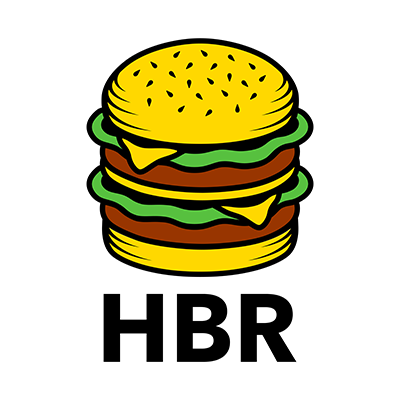 I joined Hamburger Business Review in 2024 as producer, editor, and co-host of Season 2. Joining Mike Merrill and Zach Rose, I upgraded the show’s production values while retaining a near-zero budget. Each show is recorded as a triple-ender and then edited on my end. I’m very proud of this one! It’s a labor of love, and it’s…somehow about McDonald’s?
I joined Hamburger Business Review in 2024 as producer, editor, and co-host of Season 2. Joining Mike Merrill and Zach Rose, I upgraded the show’s production values while retaining a near-zero budget. Each show is recorded as a triple-ender and then edited on my end. I’m very proud of this one! It’s a labor of love, and it’s…somehow about McDonald’s?
The thesis of this show is that McDonald’s touches everything. We can issues from many realms—social, economic, environmental, health—through the lens of this gigantic corporation and employer. We are not here to celebrate McDonald’s; we are here to see how it affects our world.
Election Ride Home (Producer/Editor/Host, 2019-2020)
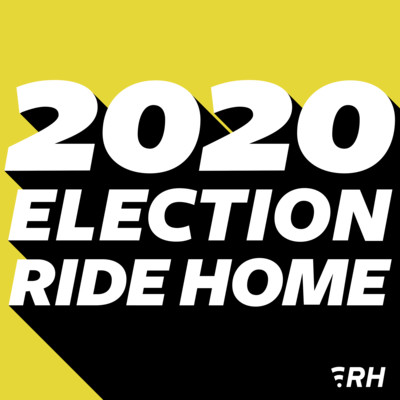 The Election Ride Home began as the Primary Ride Home during the primary season leading up to the 2020 presidential election in the US. At the time work began (March 2019), there were more than a dozen major candidates vying for the Democratic nomination, and it was frankly confusing to know who was doing what. In the early days it was typical for new candidates to announce and/or drop out on a daily or weekly basis. (I ran a spreadsheet to keep track of everybody, and even calculated how long their run lasted.)
The Election Ride Home began as the Primary Ride Home during the primary season leading up to the 2020 presidential election in the US. At the time work began (March 2019), there were more than a dozen major candidates vying for the Democratic nomination, and it was frankly confusing to know who was doing what. In the early days it was typical for new candidates to announce and/or drop out on a daily or weekly basis. (I ran a spreadsheet to keep track of everybody, and even calculated how long their run lasted.)
The name change (from “Primary” to “Election”) came after a few months as the Republican primary briefly became a viable thing, and the show broadened out to deal with other election-related issues and non-presidential races.
I created this show in partnership with Ride Home Media, which was cofounded by my friend and collaborator Brian McCullough. The format of the show was a daily news roundup posted by 5pm Eastern time. Minimum run time was 15 minutes (excluding any ads), Monday through Friday, except for federal holidays. You can check out the entire archive here. It was the second show on the Ride Home Media network, after the Techmeme Ride Home (see below for more on that).
My work on this show involved daily news gathering, script writing, recording, editing, posting, and promotion via social media. I did the whole package, and was typically up around 3am Pacific to get it out on time. Many political events (notably debates) happen in the evenings, so I’d stay up for those and engage social media followers with things like Debate Bingo, while also grabbing live audio clips for the next day’s show.
I hosted the show from March 2019 through January 2020. The show formally ended about six weeks after I left, when two things became clear: Biden was certain to get the nomination and the COVID-19 pandemic had completely supplanted the political news cycle. (Both of these events meant it was difficult to locate 15 minutes of real election-related news every day, whereas in the previous year it was hard to trim it down!) It was a good run, and if you ever need someone to give you a crash course on what happened in that 2019 primary, I guess…call me?
Trauma InJustice (Producer/Editor, 2021)
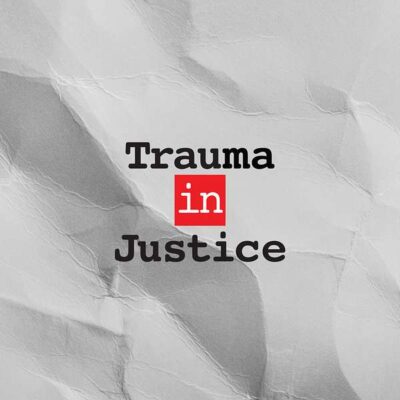 I worked with Alison DeBelder and Chris Moser to create and produce their show Trauma InJustice, a podcast devoted to the criminal justice system and its handling of trauma. First I did an analysis of what tools the hosts had available for recording, and advised on the best possible recording technique given that everyone was remote. Then I worked with the hosts to engage guests and record their audio as best we could given the limitations of the time. Then I collected and synced all that audio and edited each episode, then mastered audio for various technical standards (delivering to LUFS targets and so on). I appeared at one point on the show as a guest, explaining some of the technical and production process.
I worked with Alison DeBelder and Chris Moser to create and produce their show Trauma InJustice, a podcast devoted to the criminal justice system and its handling of trauma. First I did an analysis of what tools the hosts had available for recording, and advised on the best possible recording technique given that everyone was remote. Then I worked with the hosts to engage guests and record their audio as best we could given the limitations of the time. Then I collected and synced all that audio and edited each episode, then mastered audio for various technical standards (delivering to LUFS targets and so on). I appeared at one point on the show as a guest, explaining some of the technical and production process.
Death in the West (Occasional Editor/Sound Designer, 2020-2022)
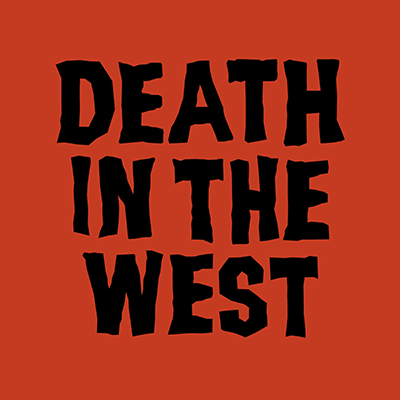 On Death in the West, I did some engineering and a little editing around the edges. For instance, I edited the original trailer, though all the episode editing was handled by the team. I helped the team with recording some of the early voice-over lines, and have done various dialogue sweetening on each episode as the show progressed. While their team did all the heavy lifting in terms of audio recording, editing, and hosting, I helped out with more obscure audio tasks such as EQ matches, volume leveling, complex noise reduction, and other tools only available within audio editors like iZotope RX (and the knowledge to use such tools).
On Death in the West, I did some engineering and a little editing around the edges. For instance, I edited the original trailer, though all the episode editing was handled by the team. I helped the team with recording some of the early voice-over lines, and have done various dialogue sweetening on each episode as the show progressed. While their team did all the heavy lifting in terms of audio recording, editing, and hosting, I helped out with more obscure audio tasks such as EQ matches, volume leveling, complex noise reduction, and other tools only available within audio editors like iZotope RX (and the knowledge to use such tools).
Techmeme Ride Home (Fill-in Host & Writer, 2018-2019)
 I worked with Brian McCullough on the Techmeme Ride Home as a writer and occasional fill-in host when he needed to take vacation or otherwise be away for a day. This work ran from 2018 through early 2019. You can dig through the archives to find me, though frankly “old tech news” might not be the most exciting thing to consume at this point. In these days, I was working with a GarageBand template that Brian created. I’d gather candidate news stories for the day, write scripts, record myself performing those scripts, and edit them down (when I was acting as a fill-in host). At other points I wrote segments for Brian to perform, or handled tasks like CMS migrations.
I worked with Brian McCullough on the Techmeme Ride Home as a writer and occasional fill-in host when he needed to take vacation or otherwise be away for a day. This work ran from 2018 through early 2019. You can dig through the archives to find me, though frankly “old tech news” might not be the most exciting thing to consume at this point. In these days, I was working with a GarageBand template that Brian created. I’d gather candidate news stories for the day, write scripts, record myself performing those scripts, and edit them down (when I was acting as a fill-in host). At other points I wrote segments for Brian to perform, or handled tasks like CMS migrations.
This American Life (Reporter, 2010)
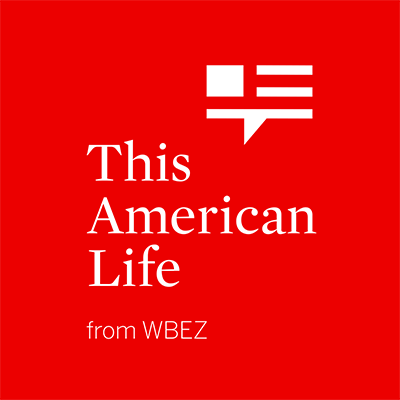 I reported a story for This American Life on Episode 409: “Held Hostage.” My report is Act III. In it, I tell the true story of a man who is literally paralyzed by happiness, due to a neurological disorder. Matt Frerking’s disorder, narcolepsy with cataplexy, is about as common as MS, but he has a very severe case that affected him late in life. The story is fundamentally about the cost of human connection. For most of us, connection is entirely positive: When we experience loving feelings toward someone else, we are rewarded. But for Matt, that emotional experience causes him to lose control over his muscles. When that’s what happens to you, how do you maintain a marriage? How do you maintain intimacy? How do you think about what happiness even is, given that it’s always paired with a cost? Listen to the story for more.
I reported a story for This American Life on Episode 409: “Held Hostage.” My report is Act III. In it, I tell the true story of a man who is literally paralyzed by happiness, due to a neurological disorder. Matt Frerking’s disorder, narcolepsy with cataplexy, is about as common as MS, but he has a very severe case that affected him late in life. The story is fundamentally about the cost of human connection. For most of us, connection is entirely positive: When we experience loving feelings toward someone else, we are rewarded. But for Matt, that emotional experience causes him to lose control over his muscles. When that’s what happens to you, how do you maintain a marriage? How do you maintain intimacy? How do you think about what happiness even is, given that it’s always paired with a cost? Listen to the story for more.
Important note: This report also inspired the 2019 film Ode to Joy, staring Martin Freeman, available on many digital platforms. I did script review and am credited in the film as writing the original source material.
Guest Appearances
Special Ed Rising (Guest, 2024)
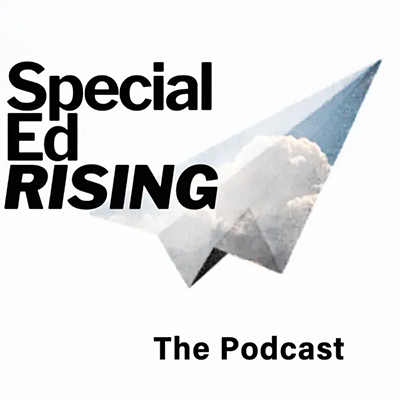 I appeared on Special Ed Rising with Mark Ingrassia to discuss my short film Access. This was a great discussion, as it was all about the strategy behind creating a film with a mission. It also gets to a fundamental truth of my creative work: Just about everything I make can be expressed as text. Knowing this has helped me understand how to communicate my work in different forms and to different audiences; you can enjoy Access as a piece of writing, as a film, or as audio. Those are all viable forms for the work.
I appeared on Special Ed Rising with Mark Ingrassia to discuss my short film Access. This was a great discussion, as it was all about the strategy behind creating a film with a mission. It also gets to a fundamental truth of my creative work: Just about everything I make can be expressed as text. Knowing this has helped me understand how to communicate my work in different forms and to different audiences; you can enjoy Access as a piece of writing, as a film, or as audio. Those are all viable forms for the work.
Piece Dependency Podcast (Guest, 2020 & 2024)
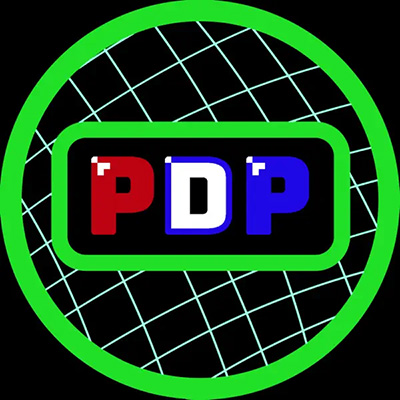 I had the honor of appearing on the Piece Dependency Podcast twice. PDP is the premiere Classic Tetris interview show, and I am the guest on Episode 6 in 2020 and Episode 43 in 2024. Both of these discussions are about my documentary series Best of Five: The Classic Tetris Champions. In the first appearance, I was still raising money to fund completion of the series—and it was just weeks away from the untimely death of one of my main interviewees. In the second appearance, the series is out and I have a lot more gray hair.
I had the honor of appearing on the Piece Dependency Podcast twice. PDP is the premiere Classic Tetris interview show, and I am the guest on Episode 6 in 2020 and Episode 43 in 2024. Both of these discussions are about my documentary series Best of Five: The Classic Tetris Champions. In the first appearance, I was still raising money to fund completion of the series—and it was just weeks away from the untimely death of one of my main interviewees. In the second appearance, the series is out and I have a lot more gray hair.
Medical Humanities Podcast (Guest, 2020)
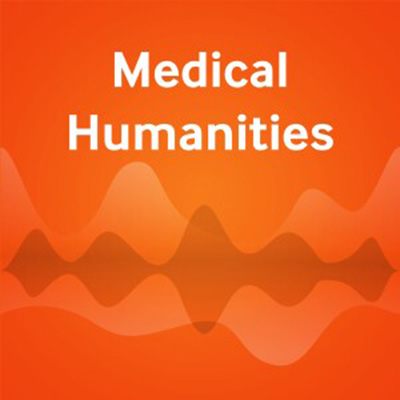 I appeared on BMJ’s Medical Humanities Podcast to discuss my short film Access shortly after its launch. Medical Humanities Journal Editor-in-Chief Brandy Schillace brought wonderful questions and a holistic understanding of the topic. Sample quote: “[T]he thing that’s resonated the most with audiences is Cory [saying], ‘I am not asking for a different thing to be made for me. I’m not asking for a thing to be adapted later for me.’ I’m paraphrasing here. He’s saying, ‘I want the thing to be designed having thought about people like me or lots of kinds of people from the get-go, right?'”
I appeared on BMJ’s Medical Humanities Podcast to discuss my short film Access shortly after its launch. Medical Humanities Journal Editor-in-Chief Brandy Schillace brought wonderful questions and a holistic understanding of the topic. Sample quote: “[T]he thing that’s resonated the most with audiences is Cory [saying], ‘I am not asking for a different thing to be made for me. I’m not asking for a thing to be adapted later for me.’ I’m paraphrasing here. He’s saying, ‘I want the thing to be designed having thought about people like me or lots of kinds of people from the get-go, right?'”
Words Matter (Guest, 2019)
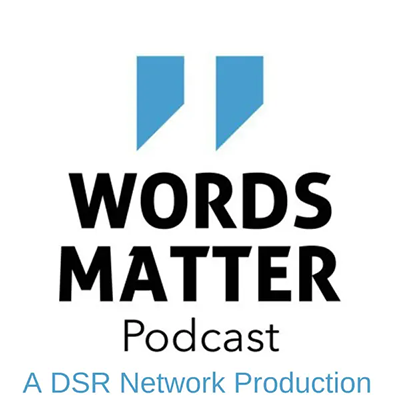 I was invited to speak with Adam Levine about American politics during the run-up to the 2020 election. At the time I was hosting The Election Ride Home (see above on this page) on a daily basis. In this interview, we get into the challenges of distilling information. When writing and delivering a 15- to 20-minute show (which was the remit for ERH) I had to be careful to understand what I did and didn’t know, and act responsibly based on that knowledge. If you’re curious about that show, this is a good listen. (The best archive I’ve found of this episode is way down on this page; search the page for Chris Higgins and you should find it.)
I was invited to speak with Adam Levine about American politics during the run-up to the 2020 election. At the time I was hosting The Election Ride Home (see above on this page) on a daily basis. In this interview, we get into the challenges of distilling information. When writing and delivering a 15- to 20-minute show (which was the remit for ERH) I had to be careful to understand what I did and didn’t know, and act responsibly based on that knowledge. If you’re curious about that show, this is a good listen. (The best archive I’ve found of this episode is way down on this page; search the page for Chris Higgins and you should find it.)
I appeared on The BMJ’s Medical Humanities podcast to discuss my short film Access shortly after its launch. Editor Brandy Schillace brought wonderful questions and a holistic understanding of the topic. Sample quote: “[T]he thing that’s resonated the most with audiences is Cory [saying], ‘I am not asking for a different thing to be made for me. I’m not asking for a thing to be adapted later for me.’ I’m paraphrasing here. He’s saying, ‘I want the thing to be designed having thought about people like me or lots of kinds of people from the get-go, right?'”
Internet History Podcast (Guest, 2014-2015)
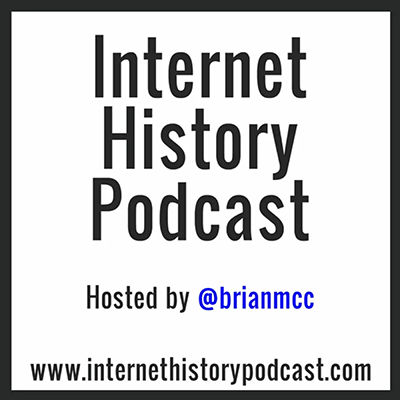 I appeared as early as 2014 on Brian McCullough’s excellent Internet History Podcast. The show primarily focused on interviews with tech folks, and would form the basis of Brian’s book How the Internet Happened.
I appeared as early as 2014 on Brian McCullough’s excellent Internet History Podcast. The show primarily focused on interviews with tech folks, and would form the basis of Brian’s book How the Internet Happened.
Brian brought me on for a handful of “analysis episodes,” which were essentially cultural discussions. Check out Analysis Episode 1, Analysis Episode 2 (Early Online Services), and Analysis Episode 4 (“Clutching Pearls”).
In addition to on-air appearances, I did some behind-the-scenes production and business work for the show. Part of that work involved inserting dynamic ads after the shows aired, which entailed trying to find clean edit points for those ads. This taught me a major lesson I used in all future work: Always drop to silence for at least a second at several key points in the episode! Make natural breaks! You never know later when you’ll need them.
The New Disruptors (Guest, 2014, 2018)
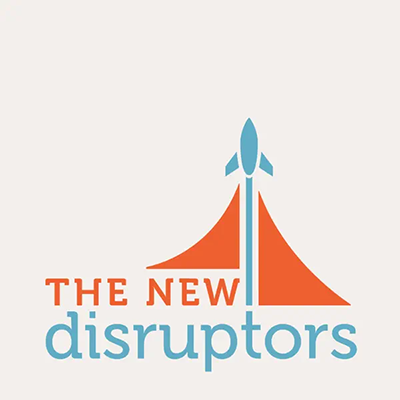 I appeared as a guest on Glenn Fleishman’s show The New Disruptors twice. First, in 2014 when promoting the documentary Coined, which was at the time trying (and ultimately failing) to gain funding on Kickstarter. That episode is It’s Like Money You Can’t Hold with Chris Higgins and Adam Cornelius (Episode 80).
I appeared as a guest on Glenn Fleishman’s show The New Disruptors twice. First, in 2014 when promoting the documentary Coined, which was at the time trying (and ultimately failing) to gain funding on Kickstarter. That episode is It’s Like Money You Can’t Hold with Chris Higgins and Adam Cornelius (Episode 80).
I came back in 2018 when Glenn did a small run of shows featuring people whose ancestors made things. My great-grandfather H.L. Spaunberg was an inventor who patented a variety of mechanical items. Although I never knew him (he died before I was born), the legend of H.L. looms large in my family. To prep for this, I interviewed my mother about H.L. and got a huge trove of documents from my folks (including a few patents I hadn’t even heard of before then—a good reason to talk to people about this kind of thing while they’re still around!). This one is Grand Inventions: Counting Gears with Chris Higgins (Episode 105).
How to Do Everything (Guest, 2012)
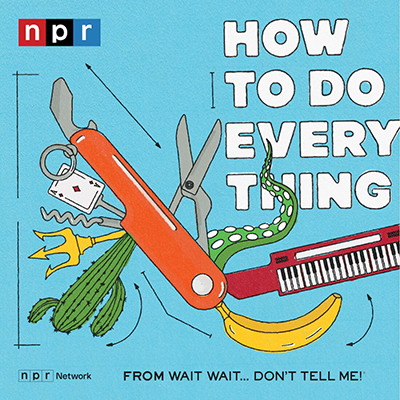 I appeared on How to Do Everything to discuss a Mental Floss article I wrote about whether blowing into Nintendo cartridges actually worked. The podcast is Episode 78: Public Toilets, Debate Prep and Nintendo (October 5, 2012). The original blog post is Did Blowing into Nintendo Cartridges Really Help? (Note: It appears that Mental Floss no longer has the images for this post, which is a shame; here’s the cache from Archive.org with all the images intact.) In case you’re curious and don’t want to listen to all that, I’m pretty confident that blowing into the cartridges did nothing (except perhaps speed oxidation of the contacts on that cartridge…which is bad).
I appeared on How to Do Everything to discuss a Mental Floss article I wrote about whether blowing into Nintendo cartridges actually worked. The podcast is Episode 78: Public Toilets, Debate Prep and Nintendo (October 5, 2012). The original blog post is Did Blowing into Nintendo Cartridges Really Help? (Note: It appears that Mental Floss no longer has the images for this post, which is a shame; here’s the cache from Archive.org with all the images intact.) In case you’re curious and don’t want to listen to all that, I’m pretty confident that blowing into the cartridges did nothing (except perhaps speed oxidation of the contacts on that cartridge…which is bad).
CBC Spark (Guest, 2008)
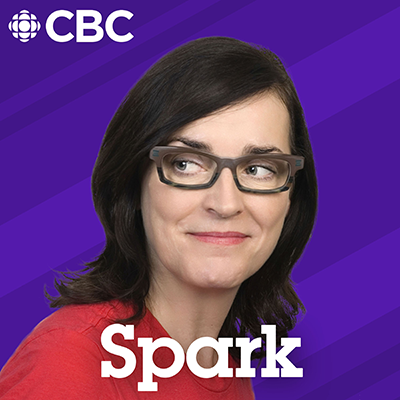 Back in the Dark Ages of the internet, I appeared alongside Hugh Crawford and Betsy Reid on CBC’s Spark. This was June 18, 2008. We discussed the story of Jamie Livingston, which I had broken for Mental Floss by accidentally finding Hugh and Betsy’s “not intended for public consumption” website featuring Jamie’s images. In doing that, I cracked open a story that has defined my professional career since. It’s the story of a man who took one Polaroid photo every day, until the day he died. I began to understand that story as being about hope and memory—and yes, about what it means to mark our days and die. In the decade since then, I met and interviewed Hugh, along with many other people in this story. You can find the episode on Archive.org, as it appears to be gone from the regular Spark podcast feed.
Back in the Dark Ages of the internet, I appeared alongside Hugh Crawford and Betsy Reid on CBC’s Spark. This was June 18, 2008. We discussed the story of Jamie Livingston, which I had broken for Mental Floss by accidentally finding Hugh and Betsy’s “not intended for public consumption” website featuring Jamie’s images. In doing that, I cracked open a story that has defined my professional career since. It’s the story of a man who took one Polaroid photo every day, until the day he died. I began to understand that story as being about hope and memory—and yes, about what it means to mark our days and die. In the decade since then, I met and interviewed Hugh, along with many other people in this story. You can find the episode on Archive.org, as it appears to be gone from the regular Spark podcast feed.
Incidentally, my blog post is also part of the inspiration for Number Our Days: A Photographic Oratorio, which premiered in 2024.